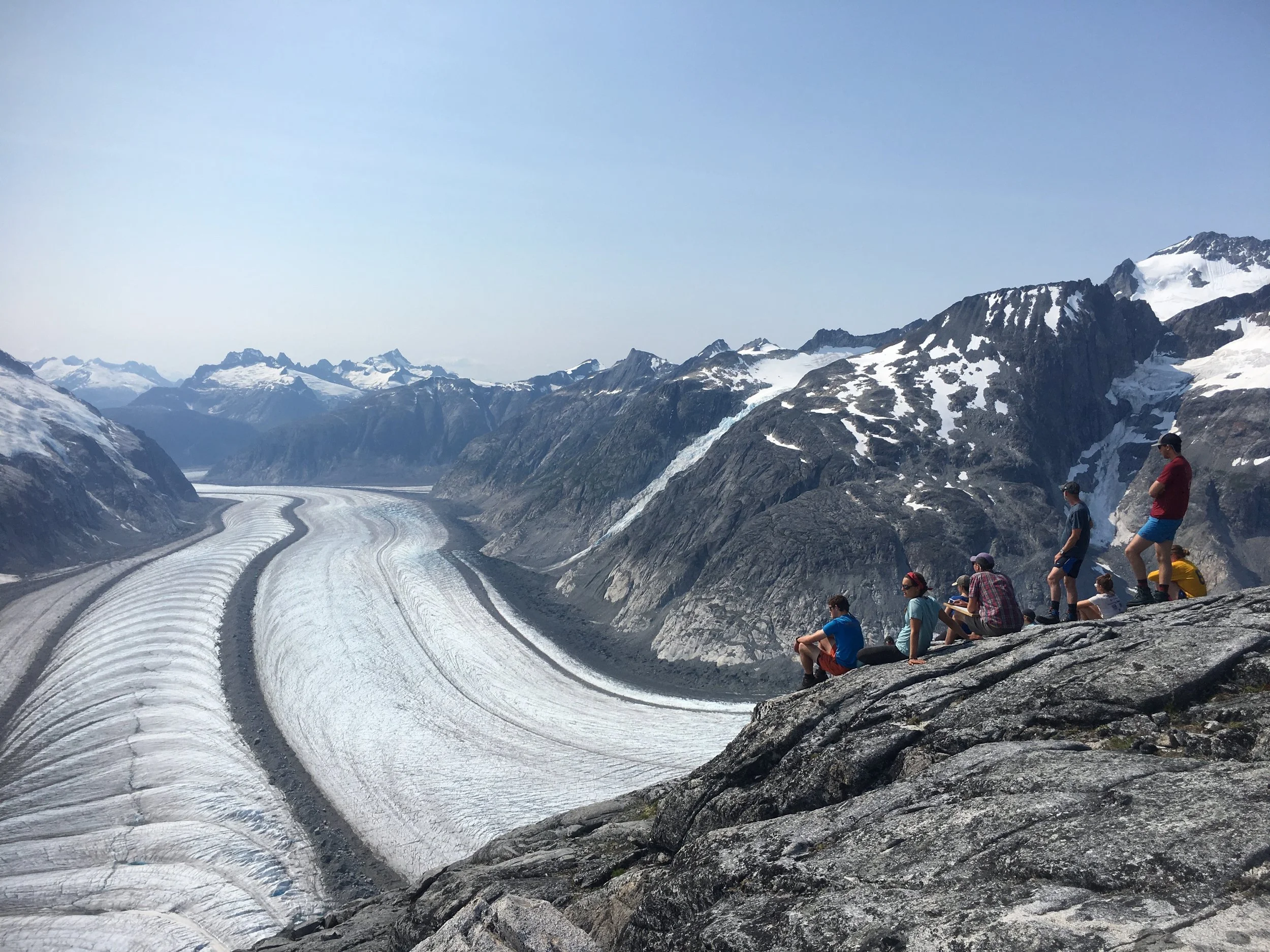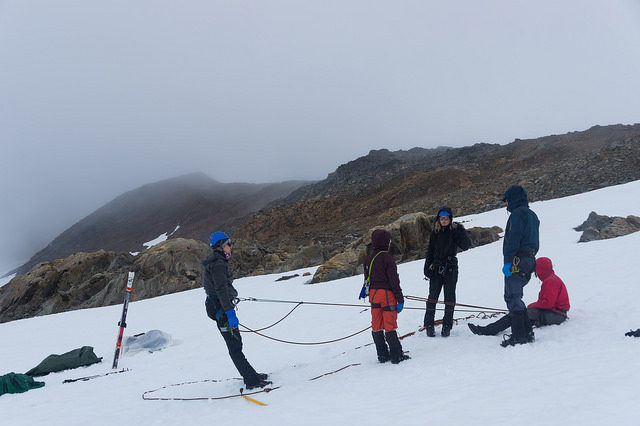JIRP provides (and requires) glacier safety training for all participants. Summer conditions on the Juneau Icefield are somewhat different than what new JIRPers may have encountered in other glacial environments, and infrequently used skills get rusty during the off-season. Because safety is of the highest priority when working in the backcountry, we require every participant to go through some safety training every year.
The JIRP season starts with a two-week staff training for the JIRP safety staff. Our Safety Manager, an IFMGA-certified mountain guide with extensive experience on the Juneau Icefield, teaches a five-day refresher class to the JIRP safety staff. This covers both the relevant skills and how to teach these skills to students and faculty. The safety staff training also covers a variety of other topics: risk management, group leadership, JIRP camp management, and advanced wilderness first aid. For the rest of the field season every party that leaves camp must be accompanied by either a JIRP safety staffer or a faculty member with JIRP advanced safety training (more on that below).
For JIRP faculty, there are three avenues to achieve the required safety training. Which one you choose will depend on prior experience, your long-term goals working with JIRP, and your timing for this summer.
Option 1: Safety Week (aka Block 1/Camp 17)
Staffer Annika Ord (orange pants) works with students and a new faculty member on a crevasse rescue system with a four-person rope team. Everyone to work through new skills on flat or gently sloping ground before jumping onto a steep snow slope. Photo: Daniel Otto.
Faculty who wish to go through the entire 10-14 days safety training with students are invited to do so. This is the most in-depth safety training we offer. It occurs once a summer, at Camp 17, and includes instruction in general backcountry wellness and travel (layering, hydration and nutrition, foot care, personal hygiene, etc.), skiing instruction from a novice level, mountaineering instruction from a novice level, route finding, risk management, and JIRP communication protocols. This option is most appropriate for faculty with no experience in either backpacking, skiing, or mountaineering and who have long-term goals for working with JIRP. It is comprehensive and time consuming, but there is no replacement in terms of becoming accustomed to working on the Icefield with JIRP. Many faculty have also found that participating in Safety Week helps them understand how the JIRP students grow during the program- valuable background knowledge for joining the Expedition during a later block in future years.
Completing Safety Week to the satisfaction of the Operations and Safety Managers certifies faculty to leave camp under the supervision of a JIRP safety staffer, at a similar level of responsibility to a student.
Option 2: Two-Day Faculty Safety Training
At the beginning of each faculty block we will offer a two-day required, abbreviated safety training for incoming faculty. This will be led by the Safety Manager and will cover basic mountaineering and crevasse rescue skills. This training starts with wearing and using a harness, continues with familiarizing yourself with prussiks, carabiners, and slings, and culminates in a practice crevasse rescue. This option is most appropriate for faculty who are already comfortable working in cold and rainy conditions, are comfortable with cross-country skiing, and cannot attend Safety Week. It is the most basic safety training we offer, and every faculty member is required to pass it every season before they are allowed to leave camp.
Completing Faculty Safety Training to the satisfaction of the Operations and Safety Managers certifies faculty to leave camp under the supervision of a JIRP safety staffer, at a similar level of responsibility to a student.
Option 3: Faculty Advanced Training - Safety (FATS)
Practicing one-on-one crevasse rescue under the supervision of a JIRP staffer. Every FATS must be comfortable with this and other advanced techniques. Photo: Sasha Leidman.
For select faculty members, especially those with extensive experience on the Juneau Icefield or advanced certifications and experience in similar glacial environments, JIRP offers an advanced safety training. The curriculum covers advanced crevasse rescue techniques, JIRP communication and emergency protocols, and leadership and conduct expectations for working one-on-one with students in the field.
Completing FATS to the satisfaction of the Operations and Safety Managers certifies faculty to leave camp without a JIRP safety staffer.*
*No one at JIRP travels alone, so you must always have at least one partner.


